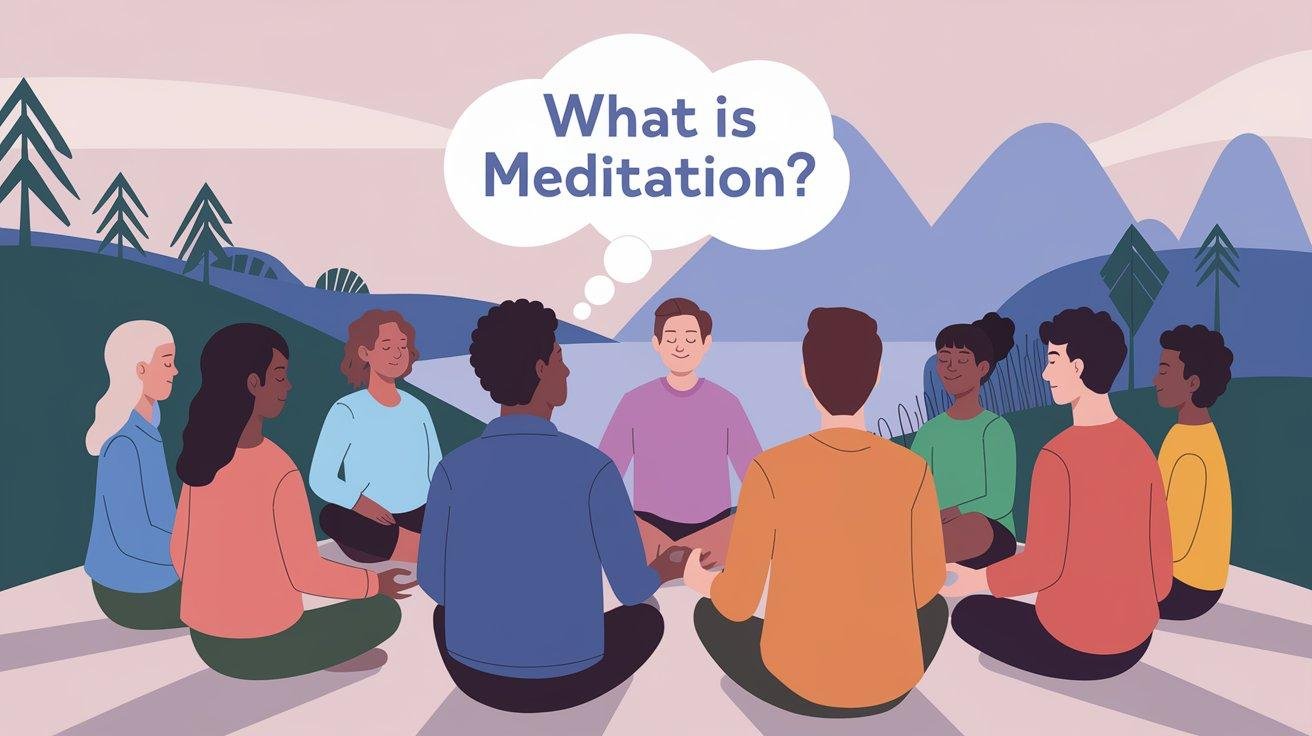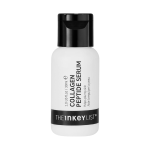Understanding the Ancient Practice of Meditation
Meditation has been a spiritual practice for centuries. It started in ancient Eastern traditions for self-discovery and peace. It spread to India and China, changing to fit local needs.
Historical Origins and Evolution
The first signs of meditation are in ancient Indian texts, like the Vedas, over 5,000 years old. Buddhism, Taoism, and Hinduism later added their own views. Meditation then traveled the world, touching cultures like Japan and the Middle East.
Cultural Significance Across Civilizations
Meditation is seen as a way to connect with the divine. In the East, it’s a path to enlightenment. In the West, it’s used for stress relief and mental health.
Modern Interpretations and Adaptations
Meditation has changed with the world. Now, it’s in secular programs, corporate wellness, and apps. These changes make meditation accessible to everyone, helping with personal growth and stress.
A tranquil scene depicting the evolution of meditation through various ancient cultures, featuring serene landscapes like a lush forest, a peaceful riverbank, and a quiet mountain top. Include silhouettes of diverse practitioners in various meditation postures, surrounded by symbols of peace such as lotus flowers and incense smoke. The colors should be soft and calming, evoking a sense of inner peace and harmony.
| Historical Period | Meditation Developments |
|---|---|
| Ancient India (5000+ years ago) | Earliest documented evidence of meditation practices in the Vedas and Upanishads |
| Buddhism and Taoism (2500+ years ago) | Adoption and refinement of meditation techniques in various schools of Buddhism and Taoism |
| Spread Across Civilizations (1000+ years ago) | Meditation practices find resonance in diverse cultures, from Zen Buddhism in Japan to Sufism in the Middle East |
| Modern Era (20th-21st centuries) | Secular mindfulness programs, corporate wellness initiatives, and digital applications bring meditation into mainstream |
“Meditation is the dissolution of thoughts in eternal awareness or Pure consciousness.” – Amit Ray
What is Meditation?
Meditation is a powerful practice that has been around for centuries. It helps people focus, find inner peace, and become more aware. Unlike other relaxation techniques, meditation is more than just stress relief. It’s a tool for personal growth and mindfulness.
Meditation is about focusing on the present moment. It helps us let go of constant thoughts and distractions. By focusing on our breath or a mantra, we can relax deeply and find clarity.
“Meditation is not about becoming a different person, a new person, or even a better person. It is about training in awareness and developing the capacity to be present.” – Jon Kabat-Zinn
Meditation offers many benefits, like reducing stress and improving thinking and emotions. It helps us find our inner wisdom and peace. This leads to a more balanced and fulfilling life.
Starting or continuing with meditation can lead to deep self-discovery. It’s a journey that can change your life. With an open mind, you can discover who you truly are.
The Science Behind Meditation and Brain Function
Meditation is more than just a way to relax. It deeply affects our brain and mental health. Studies have shown how meditation changes our brain, improving our thinking and feelings.
Neurological Changes During Meditation
Meditation changes our brain in amazing ways. It makes the part of the brain that handles information thicker. It also connects different brain parts better, helping them work together.
Impact on Brain Wave Patterns
Meditation changes our brain waves too. It moves us towards alpha and theta waves, linked to calmness and creativity. This change helps us focus better and feel more in control of our emotions.
Research-Backed Mental Health Benefits
Science backs up meditation’s mental health benefits. It shows that meditation can lessen anxiety, depression, and stress. It helps us be more mindful and manage our feelings, improving our life quality.
| Benefit | Description |
|---|---|
Stress Reduction | Meditation lowers cortisol, the stress hormone, making us feel calmer and happier. |
| Improved Focus and Concentration | Meditation boosts our brain, making us more attentive, remember better, and make smarter choices. |
| Emotional Regulation | Meditation helps us handle our emotions, reducing negative feelings and keeping our feelings balanced. |
The science is clear: meditation greatly impacts our brain and mental health. Understanding these changes and benefits helps us see meditation’s power. It’s a tool for better well-being and stress relief.
Essential Elements of Meditation Practice
Starting a meditation for beginners journey means learning the key parts of a good practice. Whether you’re new to relaxation techniques or want to improve your meditation, knowing these basics is crucial. They help you get the most out of this ancient practice.
Proper Posture: It’s important to sit comfortably but stay alert. Sit upright with a straight spine. Let your shoulders relax and your hands rest lightly on your lap or knees.
Breath Awareness: This is a key part of meditation. Paying attention to your breath helps you feel calm and present.
- Breathe deeply, letting your abdomen rise and fall with each breath.
- Notice the feeling of air moving in and out through your nostrils or mouth.
- Try different breathing patterns, like making your inhales and exhales the same length.
Concentration and Focus: It’s important to keep your attention on one thing, like your breath or a mantra. This quiets your mind and deepens your mindfulness.
Consistency and Patience: Having a regular meditation practice is key, even if it’s just a few minutes a day. Be patient with yourself. Remember, your mind will wander, and it’s okay to gently bring it back to the present.
| Essential Element | Description |
|---|---|
| Proper Posture | Sit upright with a straight spine, relaxed shoulders, and hands resting comfortably. |
| Breath Awareness | Focus on the natural rhythm of your inhalations and exhalations, allowing your abdomen to rise and fall. |
| Concentration and Focus | Maintain your attention on a single point, such as your breath, a mantra, or a visual object. |
| Consistency and Patience | Establish a regular meditation practice, even if it’s just a few minutes per day, and approach it with patience. |
By adding these key elements to your meditation for beginners practice, you’re setting the stage for a journey of self-discovery. This journey will also help you learn relaxation techniques that can improve your overall well-being.
Different Types of Meditation Techniques
Meditation is a deep practice with many forms. Each offers unique benefits for the mind, body, and spirit. As you start your meditation journey, it’s key to explore the many techniques. Find the one that fits your goals and preferences best.
Mindfulness Meditation
Mindfulness meditation helps you stay present. It lets you notice your thoughts, feelings, and body without judgment. This practice can lower stress, improve emotional control, and bring inner peace.
Transcendental Meditation
Transcendental meditation is easy and involves repeating a personal mantra silently. It aims to relax deeply and increase awareness. This can lead to better thinking, sleep, and overall well-being.
Loving-Kindness Meditation
Loving-kindness meditation, or Metta, builds compassion and kindness. It helps you feel positive towards yourself and others. This practice can make relationships better, increase empathy, and foster a positive view of the world.
Body Scan Meditation
Body scan meditation focuses on your body, noticing sensations and releasing tension. It’s great for easing pain, improving body awareness, and finding relaxation and self-acceptance.
Choosing the right meditation technique is important. The key is regular practice and an open mind. Try different types to find what works best for you and your spiritual goals.
Creating Your Perfect Meditation Space
Having a special place for meditation can really help you start or deepen your practice. It’s a chance to make a calm spot that helps you focus and relax. This space can be your own little retreat.
First, pick a quiet spot in your home. Look for a corner or a small area that feels private. It should also get some natural light, which is calming for the mind.
- Add calming things like plants, soft fabrics, and nature pictures to make it peaceful.
- Keep it simple by removing clutter and gadgets to help you stay focused.
- Get a good meditation cushion or chair to support you while you sit.
Make your space your own with meaningful items. Add quotes, symbols, or a mindfulness bell. These can make you feel more connected to your meditation.
“The body is your temple. Keep it pure and clean for the soul to reside in.” – B.K.S. Iyengar
Creating the perfect meditation space is all about what you like and need. Try out different things until you find what works best for you. This will help you relax and find peace.
Common Challenges for Meditation Beginners
Starting your meditation journey can be exciting but also comes with challenges. As you begin to practice mindfulness, you might face some obstacles. Let’s look at these challenges and find ways to make your meditation practice easier.
Managing Wandering Thoughts
One big challenge for new meditators is when the mind wanders. Thoughts naturally come and go. But learning to focus on the present moment is key. Try using focused breathing or repeating a mantra to help keep your mind focused.
Finding Time to Practice
Finding time for meditation in our busy lives can be tough. It’s important to make meditation a part of your daily routine. Start with a few minutes each day and slowly increase the time. You can also add mindfulness to your daily activities, like walking or eating.
Physical Discomfort Solutions
Sitting comfortably for a long time can sometimes cause physical issues. Try different sitting positions to find what works best for you. If you feel pain or discomfort, take breaks or do some gentle stretches to help.
Remember, building a consistent meditation practice takes time and effort. But with patience and a willingness to try new things, you can overcome these challenges. This will help you enjoy the many benefits of meditation.
Integrating Meditation into Daily Life
Making meditation a part of your daily routine can change your life. It helps reduce stress, improves focus, and brings inner peace. It’s all about making meditation a natural part of your day.
Look for moments to pause and focus on yourself. Take a few breaths during your morning commute. At work, use a timer for a quick mindfulness break. Before bed, try a guided meditation or body scan to relax.
Meditation is flexible and can fit into your busy life. By adding mindfulness to your daily tasks, you’ll feel less stressed and more focused. You’ll also enjoy the many benefits of meditation in all areas of your life.
FAQ
What is meditation?
Meditation is an old practice that trains the mind to focus and find calm. It helps reduce stress and improve mental health. It’s a way to grow personally.
What are the benefits of meditation?
Meditation offers many benefits. It can lower stress and anxiety. It also improves focus and emotional control. Plus, it boosts self-awareness and overall health.
How does meditation work?
Meditation trains the mind to be present and focused. Techniques like breathing or mantras help settle the mind. This leads to calm and peace.
What are the different types of meditation?
There are many meditation styles. Mindfulness, transcendental, loving-kindness, and body scan are some. Each helps focus and grow in different ways.
How do I get started with meditation?
Start by setting aside a few minutes each day. Sit quietly and focus on your breath. Guided meditations can help beginners. Be patient and consistent for the best results.
Can meditation help with mental health issues?
Yes, meditation can help with anxiety, depression, and stress. It promotes relaxation and emotional control. It’s a great addition to other therapies.
How do I create the perfect meditation space?
Choose a quiet, comfy spot without distractions. Add soft lights, music, or plants for calm. Make it a space that supports your meditation.
What are some common challenges in meditation and how can I overcome them?
Challenges include a wandering mind and finding time. Focus on your breath and try different postures. Be patient and consistent to build a strong routine.
How can I integrate meditation into my daily life?
Start your day with meditation or take breaks at work. Use mindfulness in daily activities. Find ways to make meditation a part of your life.
Leave a comment
Your email address will not be published. Required fields are marked *















